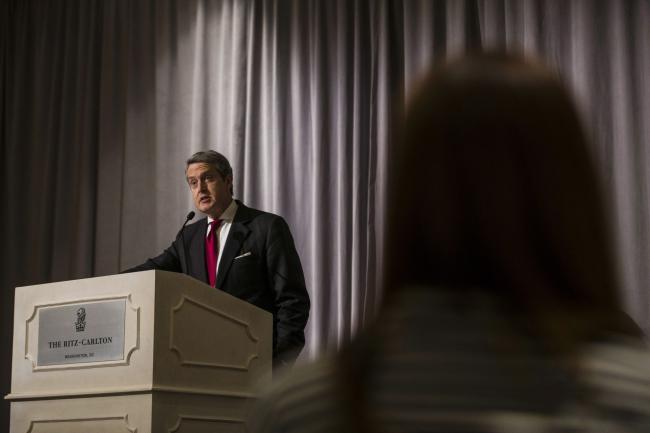(Bloomberg) -- The Federal Reserve should have started hiking interest rates before it was done tapering its bond purchases to avoid falling behind on the fight against inflation, Randal Quarles, the Fed’s former vice chair for supervision, said.
Policy makers were focused on unwinding the central bank’s asset purchases in a predictable manner to avoid disrupting markets, Quarles said during an interview with the Macro Musings podcast published Monday by the Mercatus Center.
Fed officials generally prefer to stop asset purchases -- which are designed to add support to the economy -- before raising rates, which remove support, to avoid sending mixed signals, he said. But officials should have made an exception and started raising rates last fall, once it became clear that inflation was more broad based and the labor market was tightening.
“I think that in those circumstances, for a limited period of time, to have said, ‘Yes, tapering the balance sheet has to happen over an extended period of time to avoid disrupting markets, but we’re going to begin raising interest rates even before that taper is complete because now is the time to move more aggressively in the response to inflation,’ I think that would’ve been wise,” Quarles said.
Fed watchers have criticized the central bank for being slow to respond to inflation, and policy makers have acknowledged that their forecasts missed how persistent and wide-reaching the price increases would be.
Officials began tapering asset purchases in November and wrapped the process up in March -- when they began raising rates -- and have turned progressively more hawkish in the following months to curb rampant inflation.
The central bank is now trying to catch up by aggressively raising rates and shrinking its balance sheet. Officials hiked by 75 basis points last month, the largest increase since 1994, and signaled they are likely to do the same again when they meet next week.
Bond traders and investment banks speculated that the Fed could take the more drastic move of raising rates by 100 basis points at the July 26-27 gathering, after data showed consumer prices rose 9.1% for the year through June, a fresh 40-year high. But policy makers pushed back against that possibility, saying that a 75 basis-point hike would still be a large move and expressed caution about the risks of super-sized increases.
Quarles, who left the Fed in December after his term as vice chair had expired, said he thinks officials were slowed down last year by concerns over how markets might react when they began slowing down asset purchases. The so-called “taper tantrum” of 2013, when bond yields surged and risky assets sank after then-Fed Chair Ben Bernanke hinted that the central bank may soon start to reduce its asset purchases, was top of mind, Quarles said.
“The lesson of the taper tantrum under Bernanke was that you’ve got to telegraph that well in advance. You’ve got to do that gradually, in order to avoid disrupting markets,” he said.
Quarles previously said in May that the central bank should have begun tightening in September, but officials may have been delayed by uncertainty over President Joe Biden’s decisions on Fed leadership. He also said then that he believed it would be difficult for the Fed to bring inflation under control without tipping the economy into recession.
©2022 Bloomberg L.P.
